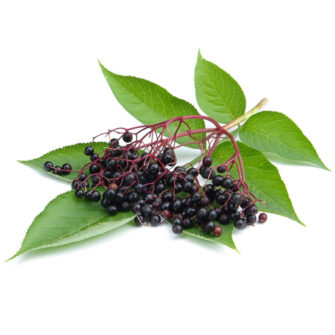Elderberry is one of the most popular edible berries in the world, with a long history of being cultivated for its medicinal properties. The berries are thought to be an effective tonic for colds and flu and are often used as an ingredient in bulk tea blends. Elderberry is a powerful little shrub with lots of uses, both medicinal and culinary.
This post will explore some of the medicinal benefits of elderberry, from its usage as a natural antibiotic to its potential benefits in treating health-related challenges.
What Is Elderberry?
Elderberry comes from a small vine, which can be found all over the world. The elderberry plant’s size can vary from low-lying shrubs to towering trees that can reach as high as 40-60 feet high and 40 inches around at the base. The berries are edible and contain bioactive compounds responsible for their healthfulness.
Elderberry Uses
Elderberry can be used to treat a variety of illnesses, including:
1. Colds and Flu: Elderberry juice can be pasteurized to make elderberry syrup, which may help treat colds and flues. Elderberry has been used for centuries to treat symptoms of colds and flu, such as cough and congestion. The fruit may also help reduce inflammation and mucus in the respiratory tract by thinning the mucus.
2. High in dietary fiber: Elderberry, like other berries, are rich in fiber. Elderberry is a good source of fiber which acts as an appetite suppressant and may help prevent certain diseases such as colon cancer by promoting the formation of protective mucus in the digestive tract.
3. Reducing wrinkles: Drinking elderberry juice regularly can reduce wrinkles and other signs of aging by decreasing inflammation, preventing water loss from the skin, and slowing the production of harmful free radicals.
4. Antioxidant: Elderberry is high in antioxidants that protect the body from free-radical damage. Free radicals are one of the causes of cancer and arthritis. The antioxidants found in elderberries help to prevent these diseases.
5. Reduces Inflammation: Elderberry has anti-inflammatory properties, which may reduce the symptoms of arthritis. In a study by the Amish in Pennsylvania, elderberry was found to be effective at reducing swelling and pain in patients.
Side Effects of Elderberry
Elderberry is considered safe for most people. However, some people may experience the following side effects when taking elderberry:
- Upset Stomach: Elderberries may cause an upset stomach when consumed in large amounts.
- Diarrhea: The anthocyanins found in elderberries can cause diarrhea. Elderberry juice should not be consumed by individuals with severe diarrhea or irritable bowel syndrome.
- Allergic Reactions: Elderberry may cause allergic reactions in some individuals, particularly those who are sensitive to the Sambucus genus. These reactions may include hives, rashes, or swelling of the face, tongue, and throat.
- Abdominal cramping: Elderberry may cause abdominal cramping in some individuals, particularly those who are sensitive to the Sambucus genus.
Contraindications Related to Elderberry
- Elderberry should not be used in large quantities, as it can result in an upset stomach.
- Pregnant women should not consume elderberry. Elderberries may cause abdominal cramping in some individuals, particularly those who are sensitive to the Sambucus genus.
Keep this in mind when consuming elderberry and consult your doctor if you have any concerns about a reaction.
Origins of Elderberry
Elderberry is a perennial shrub that can be found in the temperate regions of Europe, Asia, and North America. Generally, elderberry grows in damp shady places like river banks and near the edges of ponds.
My Favorites
- No Favorites Yet

